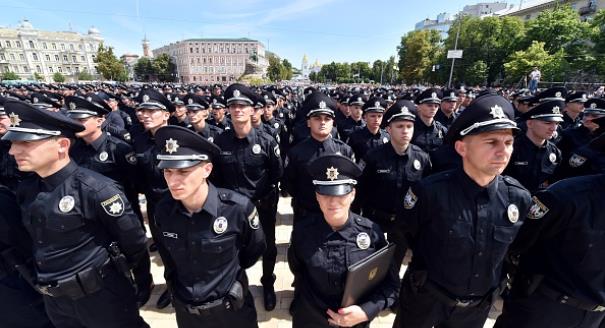The average workday of a young European professional probably starts with a coffee, catching up on the news, and then on to the office.
Add to that a rally against corrupt top prosecutors. Or support for a parliamentary bill to denounce former or current officials who had accused Maidan protesters of spoiling a New Year party for the children of Kyiv while the police assaulted protesters and thugs set activists’ cars on fire. All this at time when the former Ukrainian president, Viktor Yanukovych, was packing his cash at his mansion in Mezhyhirya. Now you have the average workday morning routine of a young Ukrainian professional.
These differences reveal three interesting trends regarding the reforms currently under way in Ukraine.
Trend one is this: the fact that such rallies are taking place nearly two years after the Maidan protests signals that Ukraine’s current political leadership lacks the will to conduct deep reforms of the courts, the prosecutor’s office, and the police. These are the very entities that are crucial in ensuring the rule of law and the implementation of reforms in most other sectors.
Some changes are taking place in the Ukrainian economy—even if slowly and sporadically—thanks to pressure from Western institutions and donors as well as the presence of a handful of ministers who are not entangled in the old, corrupt system. But the efforts of Ukrainian politicians in the sphere of the rule of law are a façade at best.
One such change—and certainly a positive one—is the introduction of a new traffic police force. Young men and women in black uniforms are gradually replacing their predecessors, whom most Ukrainians saw exclusively as representatives of the corrupt state machine, ambushing drivers in the hope of receiving hefty bribes. Today, these same Ukrainians are not trying to bribe the new police. Even minor mistakes due to inexperience do not dent public trust in the officers.
However, the new police force is not authorized to investigate wrongdoings that are far more damaging to the state than hooliganism or speeding.
Consider the following scenario. A newly appointed team of investigators responsible for fighting corruption within the Prosecutor General’s Office catches top prosecutors red-handed receiving a bribe of 3 million hryvnia (€127,000). (By comparison, the official monthly pay of a Ukrainian doctor is around 2,000 hryvnia, or €85.) On top of that, a search of the prosecutors’ offices and homes finds $500,000 (€456,000) in cash plus diamonds, gold, and weapons.
These events should be followed by a transparent trial and a harsh verdict for the corrupt officials. Instead, the culprits are doing their best to weasel their way out—understandably: if they started to speak to investigators openly, the excessive corruption they would reveal would probably look terrifying. Meanwhile, the team of investigators faces professional pressure.
The prosecutor general remains in office. His first deputy, after reportedly covering up for the corrupt employees, is forced to resign under pressure from civil society—if only to be replaced by a man who had long reported to him, rather than by someone from the team that uncovered the rampant corruption.
Disheartening as it seems, this episode points to the second trend in Ukraine: pressure by civil society works. A recent anticorruption rally was comprised mostly of activists and journalists. Yet, this does not mean that Ukrainian society is losing its appetite for eliminating corruption. Instead, it points to a transition from quantity to quality.
Qualified lawyers had initiated the rally. They work at an NGO that monitors and reports corruption in the state apparatus. Reports of the rally and interviews with the investigators appeared in most major TV and print media. Without well-organized monitoring and publicity, facilitated by the cooperation of qualified activists and reformers in the Prosecutor General’s Office, the case would most likely have ended with the squeezing out of reformers, not with the resignation of people from the old system.
This leads to the third trend: with proper support, the activists now involved in fighting corruption, drafting laws, and constructively criticizing the initiatives of the post-Maidan government may well shape the foundation of Ukraine’s politics in the short to medium term.
Given the resilience of the old system, this may look like a utopia to many. However, months before Yanukovych fled, the mere possibility of the resignation of a corrupt official as a result of public outrage had been a utopia, too.
It is now crucial to support civil initiatives. Grants for civil society activists are among the most effective bricks for building a solid foundation for a potentially different Ukraine.
It is equally important for Ukraine’s partners to interact with these initiatives and initiators on a regular basis to understand all the nuances of local political processes. These activists are knowledgeable enough to perceive these nuances, and most of them are not linked to the old system or its business interests. Ukraine’s Western partners can make the Ukrainian government hear the voices of these activists much better than it does now.
The old system is determined to resist change, while the post-Maidan activists are determined to change that system. Yet it is not only the determination and patience of Ukrainians but also similar qualities among Western partners that will largely shape the development of current trends in Ukraine.
European and U.S. policymakers often claim that Russia, with its tolerance for autocracy and kleptocracy, has a chance to change and become more democratic. If that is the case, then being disheartened by the slow pace of change in Ukraine would be shortsighted and damaging to the long-term prospects of the entire region.
Anna Korbut is deputy chief editor at The Ukrainian Week.








